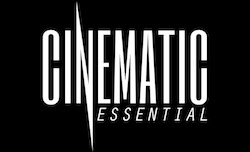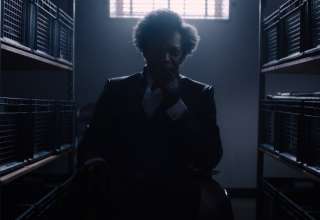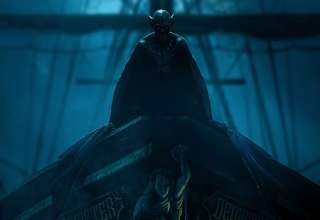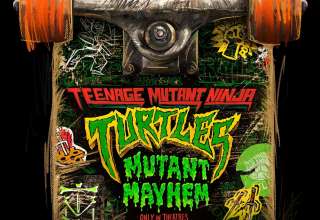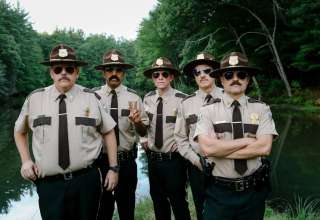I had a ton of questions to ask Leigh Whannell heading into my interview with him. I knew a good bit about his career up until this point, but I was sure there were plenty of other things to find out about him and how he operates. I didn’t know what to expect, but what I got was pretty in-depth as we spoke about things that ranged from his desire to step into different genres, his new film entitled Upgrade, and what he’s learned after stepping into the role of director for just the second time. There was even a moment when we got to talk about Boston and how cities like it have helped him during his writing process.
Cinematic Essential: Have you ever been to Boston before?
Leigh Whannell: I’ve been here a few times, actually. I actually came here when I was writing this movie. Before I had kids, I used to do this thing where I would fly to different cities, get a hotel room for a week, and write all day then go out at night. And Boston was one of the cities I came to.
What was that experience like?
Whannell: It was great. I loved it. You’re kind of in this weird world. You don’t leave the hotel room and you’re writing. Then I night I’d go wandering around. I loved doing that. I don’t do it anymore, because I’ve got kids now and it’s tough to say to the wife, “I’m just going to disappear for a week and leave you.”
What was your reasoning for adopting that practice?
Whannell: Writing films is something that’s really hard. You want to help the process as much as you can and cut out the noise. It’s getting more difficult because of the internet. There are so many distractions. In my mind, flying to a random city and holding up in a hotel room was a way of cutting out distractions. Getting away from all that.
You’re from Australia, but where do you live now?
Whannell: I live in Los Angeles. I moved there just after the first Saw film. I was in Australia, then we came over and did Saw. And when we came over to publicize the movie, we never left. So we’ve been living there for like twelve years.
So you liked it that much?
Whannell: Yeah, it was one of those situations where you just wake up twelve years later and you go, “This is where I live now.” Rather than me choosing to live there, it chose me.
Was making movies in Hollywood always a goal of yours?
Whannell: I always wanted to make Hollywood films. I was like every other kid my age. I loved Star Wars, Raiders of the Lost Ark, Jaws, basically any Spielberg film. I was obsessed with movies. In high school, I had a great teacher talking to us about films and I discovered that filmmaking was a job. The shots and the editing didn’t just happen. There’s artistry behind it. So, I stopped looking at films strictly from a fan perspective and started looking at them from a filmmaking perspective. And as soon as that happened, I wanted to be making films in Hollywood. I feel so grateful to be here. The fact that I’m sitting here talking to you is a privilege.
You began your career with horror, but you’re now moving into sci-fi with this movie.
Whannell: Yeah.
Is sci-fi something that you’ve always wanted to do?
Whannell: Yeah, for sure. I guess I’m known for horror because the films I’ve writing are in that genre, but I’ve actually written a lot of other screenplays in other genres. I wrote a kids movie. Kind of like a fantasy along the lines of something like Labyrinth. And sci-fi is something that I’ve always wanted to do since I love that genre. Actually, it’s a pretty malleable genre. Like you can fuse it with other genres. A lot of the genres I really love have horror in their DNA. I like Alien, Aliens, The Thing, The Fly. I mean these are al sci-fi horror movies, and that’s a genre I just love. I think I came through this movie through that lens.
Would you fit something like the original Terminator in there?
Whannell: Oh yeah. The first Terminator is just great. The second Terminator film is great, but I love the first one.
The first one kind of has those horror elements to it.
Whannell: It’s basically like the robot version of Halloween. You’re stalked by a killer and you’ve got to get away. It’s such a great film.
Was that one of the inspirations behind Upgrade?
Whannell: Not just in terms of great storytelling, but I really used that film as a model for how you can make a sci-fi film on a lower budget. If you look at the first Terminator, it’s pretty “run and gun.” It’s “lean and mean.” It’s not a big budget movie but they still express a big idea. The idea that there’s this war in the future and there’s this robot that is sent back. I love that about it. I became obsessed with the idea of doing something like that, so Upgrade is my attempt to make a film in that spirit of big sci-fi ideas presented at a lower budget.
What other films did you find inspiration for when making Upgrade?
Whannell: Other films from the same era were films like Robocop, Videodrome, Total Recall, The Thing, even The Matrix or something like that which is obviously a much bigger budget. I was really inspired by the way that film took genre elements from other movies like fight scenes and compacted them into something new. They had something new to say. They gave the fight scenes something different. I became inspired with making fight scenes that didn’t look like anything else out there.
How’d you come up with the ideas for the fights in this movie?
Whannell: I remember when I was writing the script, I was very keen to portray Grey (the lead character played by Logan Marshall Green) in that way. I wanted him to move in this robotic fashion and in a stilted way. I wanted it to look strange. Strange is a funny word because when technicians on a film set have to interpret that, it’s such an ambiguous word. Our way of doing that was to train Logan (Marshall Green) with a dance and movement instructor and with the stunt team and then to use the camera to lock onto him so that the camera moves with him and hopefully have all of that stuff combine to make something that looks unique.
Did directing Insidious 3 give you the confidence to move forward with this as your second feature?
Whannell: Absolutely. I don’t think I could have made Upgrade as my first film. I’m happy I didn’t, because I think this film would have really been overwhelming if it had been my first film. What Insidious 3 gave me was confidence. They were good “training wheels.” Making that film was good in terms of walking through the process of mixing, through everything like that.
Since you’re kind of known for horror, do you ever worry about becoming typecast as a director or writer?
Whannell: Typecasting can absolutely apply to directors. You see it all the time. To a certain degree, writers are in charge of their own fate when it comes to typecasting, because I’m creating the material. I’m sitting there writing the movie. So, if I want to do a comedy, I have to write a comedy and really push that. So, all I did was kind of wear Blumhouse down. I just kept grinding them down and asking them and pushing this movie. And I had a good bargaining chip because I was doing the Insidious movies with them. Hopefully, this helps get me out of the sort of typecasting.
When you started with James Wan, he was considered the director, but has directing something you’ve always wanted to do?
Whannell: I thought of myself as part of a team. I didn’t necessarily want to direct. I was happy writing and working with James. I think in the back of my mind, I knew the day would come when I would direct. I just didn’t know when. And like a lot of things in life, it just sort of lands in your lap rather than you striving for it. The opportunity was suddenly pushed on me to do Insidious as a director. In my mind, I always thought my first film would be an original film, so I agonized for five minutes. I’m so glad I said yes. It was such a great film to direct. It was fun to make and I’m proud of it, but it was also a great film to get my “feet wet” with directing before going into this.
Was directing easier or more difficult than you thought it would be?
Whannell: I wouldn’t say it was easier, but I would say it was more fun than I thought it was going to be. I went into directing thinking it was going to be the biggest headache and the biggest nightmare of all time. It is stressful. I would be careful to emphasize that. It is a stressful job and there are times you want to pull your hair out, but it was actually more fun than people let on. I think maybe directors are keeping the fun factor a secret so that no one else applies to become a director.
How much control did you have on this movie?
Whannell: A lot. That’s the fun about making a film with Blumhouse. They don’t offer you a lot of money or resources to make your film, but what they do offer is creative freedom. They let you make the film and they give you a budget to shoot the movie and they really get it done. I love working with them, because they’re not interested in talking about making films. They want to make films, so they’re a great place for people to work if you just want to get on with it, you know? You don’t want to languish in development for years and years.
What did you like the most about directing?
Whannell: I think I had fun just making all those little decisions. I love that process of looking at the wardrobe, picking what color the shoes are, the type of sunglasses, the water bottle. Everything you see in a frame in a movie has been thought about. Every stitch of clothing, every lamp or prop. I love obsessing over those details.
How is it working with the cast and crew as a director?
Whannell: You’re relying on these people. As the writer of the film, I have this specific vision of what I want the film to be. I can’t get there without a great crew and a great cast. They make the film. Every artist and technician on that film set are the only ones who can give you what it is that you’re looking for. The director can’t make a certain actor do exactly what they want them to do. You need to rely on other people and I don’t think they should take as much credit as they do, because you really are reliant on your crew and your cast.
Do you feel like writing your own stuff gives you a sense of ownership over your films?
Whannell: Yeah, absolutely. It gives you the authority to be the director in my opinion. For myself, if you’ve written a script, then you could be sitting at a table with all of your crew around. All the lighting people, make-up people, stunt people are sitting around a long table and know more about a lot of jobs than you do. Maria the costume designer knows more about costumes than I do. The authority that I have at the table is that I know the story more than anyone else. I know the world. Any question that’s thrown at me I can answer and describe what I want. I can’t stitch a dress together, but I can describe the dress. So that I think is the advantage of writing the material yourself.
Do you see yourself directing films from other writers?
Whannell: Right now, no. Right now, I feel like I only want to make films based on my own screenplays, because I love writing too much and I love creating the world myself. I feel like if I directed off of somebody else’s screenplay, I would be bypassing a whole step in the creative process. I know there are a lot of great directors out there who don’t write their own material, whether it’s David Fincher or whoever, but I definitely would prefer my own scripts. I’m not saying that my scripts are better than what’s out there. It’s just that I feel more comfortable with it.
Since you’ve done all three now, what do you prefer out of acting, writing, and directing?
Whannell: Directing would be my number one. I would hate to choose, but if I had to, I’d choose directing because you sort of get to dip your toes in all those pools. You get to do a bit of writing. When you make the film, you write the film. You get to work with the actors, so in a way, you’re part of the acting ensemble and you’re guiding performances. You get to sit in on the sound mixing. That’s one part of filmmaking that I love. I love putting the soundtrack in there, working with the composer, working with the sound designer. On the mixing stage is when the movie really comes to life in my opinion.
There’s a documentary I saw recently about sound mixing. I can’t remember the name of it, but it was really interesting and looked at all the stuff you’re talking about.
Whannell: That’s the thing about sound, that it’s an unconscious thing. Your eye takes in visuals and really concentrates on them, which is why you hear everybody praising the look of a movie. It’s rare to hear someone say the sound design of that movie was incredible, because it all goes in and it’s all unconscious. You only really notice sound design when it’s bad. Good sound design goes unheralded and forgotten, but I love it. I tell you, man, my favorite stage of the whole process is sitting in the mixing stage. That’s my favorite part of making a film, because you sit in a big room and a big screen. It just seems like play. It’s just fun.
Upgrade was shot in Australia?
Whannell: Yup, in Melbourne.
Were there any specific reasons you went back home to shoot there?
Whannell: Funny enough, the producers were the ones who wanted to shoot it in Australia for the cost benefits. Australia was offering a tax rebate, there was a good exchange rate at the time, and last but not least, I’m Australian. The fact that I’m Australian means we qualify for some government funding and we got to have Film Victoria and some of the filming bodies in Australia put some money into the film. So it was just really an economical decision, but once we decided to shoot in Australia, I insisted we shoot in Melbourne, my hometown.
Why was that?
Whannell: Because I feel like Melbourne is the only city in Australia that really suits this kind of gritty sci-fi noir. The other cities are too sunny looking. They don’t fit, but Melbourne does for sure.
What was it like being back home for a few months?
Whannell: Awesome, because ever since I’ve been in Los Angeles, my visits to Australia are usually very fleeting. It’s usually “Hi, dad! Merry Christmas! Bye!” And this felt like living there again. It’s funny, because where ever you grow up, that city will stay in your blood. It’s part of your DNA because you know it so well. I just know Melbourne so well. Every street corner is a nostalgia bomb. I can recall things that have happened: “Oh, there’s the gutter that I threw up in. There’s the place where I bought my first pair of jeans. Here’s a store that I used to skip school to go to and buy records.” It’s just my life, so being there and getting to shoot it was awesome.
Now, you’re an adult with kids of your own who are pretty young.
Whannell: Yeah.
Have you allowed them to watch any of your work yet? If not, when will you let them?
Whannell: I have a five-year old and she’s not allowed to watch anything yet. I would like to come to them with filmmaking. I would like to make a kids film. Like a fantasy adventure movie that a kid could watch. Hopefully, I get to make that film. If not, I’m probably not going to let my oldest daughter watch my films until she’s fourteen or fifteen.
Which one would that be?
Whannell: I’d start with Insidious, the PG-13 one before we move to Upgrade and Saw.
Would the children’s film be next?
Whannell: I don’t think it would be next, but I would love to do it. Even just talking about with you now has got me thinking about it. The problem with that movie is that it’s a bit more expensive. As soon as that happens, the wheels start grinding a bit slower, but we’ll see. Success begets success, so if Upgrade comes out and does okay, maybe somebody will come out and give me a chance to do it.
I think Upgrade should do it for you. I happen to like it.
Whannell: Thanks for that. I appreciate you taking the time to speak with me.
Oh yeah, no problem. Thanks for having me.
Upgrade opens on June 1st.
